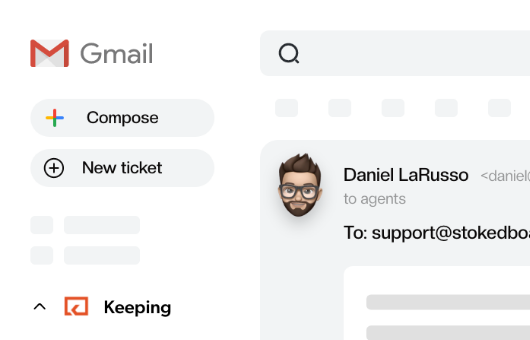
11 Ways to Deliver Personable Customer Service
To deliver personable customer service, your agents must act like humans rather than corporate robots. This entails being vulnerable and putting yourself out there, even if customers don’t respond in the exact ways that we would like
When customers interact with your brand, they have high expectations for how they should be treated. If something has gone wrong and they need help, your business has to deliver exceptional customer service to ensure that these customers don’t start taking their business elsewhere.
For 86% of customers, good customer service turns one-time clients into long-term brand champions. When you fix your customers’ problems and go above and beyond with your service, you earn your customers’ loyalty and raise their satisfaction levels. It requires essential customer service skills and dedicated customer support agents.
But good customer service has to be more than just superficial.
Sure, you can solve a customer’s issue and move on with your day, but this most likely won’t make them remember you. You must deliver personable customer service that keeps customers coming back for more.
Businesses that employ personable customer service will be more successful than those that do not.
What is personable customer service?
The Cambridge Online Dictionary defines personable as:
“Having a pleasing and attractive manner.”
This means that personable customer service is your customer service staff acting pleasingly and attractively towards customers. They deliver tailored, customized, and helpful customer service to each customer individually. Your agents are friendly and approachable, leading to customers who feel comfortable contacting them for help.
Personal customer service looks different for each customer that reaches out to your business, and there is no cookie-cutter response available. Agents must make a decision in every situation how they are going to approach the customer, and treat them like a real human being.
You must always strive to create a pleasant customer service experience, using all the skills at your disposal to put customers at ease and engage them. This isn’t easy, especially when customers may be upset, angry, or frustrated.
Personalized customer service is your business making a consistent effort to go above and beyond for customers.
The importance of delivering a personable customer service
Although it can be challenging to provide a personable service, there are numerous benefits to creating a personable experience for your customers.
Provides a strong impression of your company
Personable customer service reps make a better impression on your customers and promote positive service interactions. Customers don’t feel like they are a burden on your company when your agents are smiling, polite, and eager to assist. Their problem is dealt with promptly and professionally, and the customer can move on with their day.
Customers who are recipients of personable service are more likely to view your business in a good light.
We’ve all had the experience of interacting with a service rep who is surly and hostile. We get the impression that they want to hurry us off the phone, leaving us with a bad impression of the company. You’re unlikely to want to contact that company again if something goes wrong, leaving you to look for a more pleasant alternative.
Leads to more satisfied customers
When customers have a pleasant service interaction, they are more satisfied with the service they have received from your business. If you treat them as more than just a number, 65% of customers who have switched to a different brand because of a poor experience can be retained by your business.
Satisfied customers make fewer complaints that need to be escalated through your customer service team. Problems can be dealt with on the first try, and you can keep customer support costs under control.
Customers who are satisfied keep using your products and services and leave positive reviews about your business.
Results in deeper conversations
If agents adopt a more personable demeanor, they can get to the root of the problem with the customer. The customer feels more comfortable elaborating on the experience so the agent can gather the necessary information.
Little details that customers might otherwise forget to mention are included in the conversation and prevent the problem from recurring again. Agents and customers can establish a rapport which leads to more productive exchanges.
Personal customer service means customers relate better to your service agents and you can up the quality of service you are able to deliver.
11 tips to have a more personable customer service
1. Use the customer’s name
“A person’s name is to him or her the sweetest and most important sound in any language.” – Dale Carnegie, writer and lecturer
When you address customers by name this results in a more personable experience with your customer support team. It might be wise to stay away from informal nicknames in case you come across as too familiar, but using ‘Mr/Mrs/Ms/Miss’ shows that you’re aware of the customer as an individual.
The worst thing you can do is refer to customers by an impersonal ticket number, which makes them feel like they are dealing with a faceless corporate entity. Using a customer’s name shows them you care about them on a personal level and are engaging with them as a human being.
If you use a customer’s name, they are more likely to pay attention and be engaged in the conversation.
2. Familiarize yourself with the customer’s history
Customers who get in contact with your business expect you to know who they are and have knowledge of previous interactions they’ve had with your support team. Your customer support agents will be more personable if they have access to your customer’s interaction and order history.
The help that customers get from your agents can be more tailored and personal if agents have access to their history. Customers are less likely to have to repeat themselves and agents can understand previous solutions they have tried that didn’t work.
Being aware of your customer’s history makes your customer service more personable and streamlines the process of helping them.
3. Share your identity
As well as asking your customers their names, it’s important for customer service agents to share their own identity. If your agent is picking up a call from a customer, they should introduce themselves with their name. If an agent is replying to an email, their email should include their name, job title and a photo in the signature to make it more personal.
There’s nothing worse than getting an email back from the “Customer service department”. Customers need to know they are dealing with a real human who cares about their concerns and issues. Your customer service agents are the face of your business and they should act appropriately.
Your agents have more accountability if customers know who they are and it makes them feel better to get in touch with a person.
4. Show in-depth product knowledge
If customer support agents are able to deliver personable customer service, they must be able to demonstrate in-depth knowledge of the company’s products or services. When customers have a problem, you must be able to tell them quickly whether your product really can solve it or if they would be better served looking for an alternative.
When you have confidence in your product, your customers will have confidence in it too. Your reps have to be able to accurately recommend features and services if you are going to upsell and cross-sell to customers. If your product is not a good fit, then that’s fine too and you can recommend another product that would work better for them.
If you don’t have knowledge of your company’s products, then who else will? There are always times in customer support where it would be relevant to recommend a product.
5. Adopt a friendly tone
“Whether it’s a bored demeanor, a dismissive look or just plain rude behavior, sloppy customer service spells disaster faster than just about any other business transgression.” – Lauren Simonds, Managing Editor of Small Business Computing
The demeanor of your customer service rep is critical when it comes to creating a personable experience for your customer. Support reps who are hostile over the phone, email, live chat or social media, will drive customers away in droves. Remember, if customers are getting in touch, it’s usually because your business has let them down in some way.
A friendly tone goes a long way towards getting customers back on side and making amends for any lapse in service. Being friendly means doing little things like asking customers how their day is going, or commenting on their dog in their profile picture. Acting like a human is the key between being too casual and too formal.
When a customer service rep is friendly, they succeed in putting customers at ease during the interaction.
6. Use the right customer support software
Agents who want to deliver personal customer service need to be provided with the right software that enables them to connect with customers. If agents are struggling with unwieldy legacy systems they won’t be able to deliver the best service. When customers get in touch, they need to know their inquiry is going to be picked up by a competent customer service agent and solved in a reasonable timeframe.
Software like Keeping gives you access to all your customer’s previous conversations and tells you whether someone else is working on the same ticket. Agents can collaborate effectively on customer conversations behind the scenes, so customers receive the same personal experience. Customer inquiries can be sent to the same general support address, but replied to from a personal email account.
Consider Keeping when you are building your customer support software stack which forms the backbone of your customer experience.
7. Say thank you to the customer
One of the most important ways to be polite and courteous is to remember to say thank you to your customers for getting in touch. In reality, customers are giving you the opportunity to serve them rather than taking their business to your competitor. Say thank you at the beginning and end of the conversation.
When customers are thanked, they’ll know you appreciate their business and be more likely to return. Personalized customer service makes each individual customer feel special and like they matter to your business.
Personable customer service means using the word “thank you” as often as you can so customers know you care about them.
8. Deliver service with a smile
Even if your customer service isn’t face-to-face, delivering service with a smile is an important way to offer personable customer service. When you’re speaking on the phone, your customer can tell from your voice whether you are smiling or not. Smiling is infectious, and spreads goodwill to your customers who are getting in touch.
Customer service reps who actually enjoy their jobs are more likely to be able to create positive experiences with customers. Customers can tell when you have a bad attitude, so making the effort to smile establishes a good rapport and builds a meaningful relationship.
Of course, you’re not going to smile when a customer is angry and making a complaint. You’ll need to have awareness of the situation before you choose to smile.
9. Make it easy to get in touch
It’s impossible to be personable with your customers if you’re making your customers jump through hoops just to get in touch with your support team. If customers are forced to fill in lengthy forms, wait on hold for long periods of time, or search through your website just to find an email address, this doesn’t result in a pleasant atmosphere once they finally get through.
Presenting your contact details prominently on your website, or in customer’s order confirmation emails, for example, is the best way to ensure that customers view your reps in a positive light.
It will only be easy to get in touch if you hire enough agents to deal with your particular volume of customers. Pay attention to peaks and troughs throughout the days, weeks, and months.
10. Avoid impersonal responses
When conducting customer support, it’s likely you’ll get the same inquiries over and over.
While email response templates can save your customer support agents a lot of time, it’s important that you personalize each and every response for the individual customer. Software like Keeping allows you to save shared templates that can be easily inserted into an email with one click.
From there, it’s easy to customize your templates so they respond to your particular customer inquiry. You can add the customer’s name, and include a line at the end that makes the email more personal.
11. Understand how to close the conversation
As much as we might like to keep talking to customers forever, there comes a time when you must close the conversation. Unfortunately, when customers are upset, they might continue to bring up grievances and reject any solution that you try to offer them.
The response to this kind of situation is to ask the customer if there is anything else you can help them with. Showing the willingness to be of assistance even when the customer is complaining provides a personable experience that will end in the customer’s satisfaction.
Closing the interaction on a positive note is an essential part of giving personable customer service.
Wrapping up
“It’s through vulnerability that human beings create connections. The more vulnerable we can be with one another, the more that we’ll trust one another and the more we’ll be able to collaborate effectively.” – Neil Blumenthal, CEO of Warby Parker
In order to deliver personable customer service, your agents need to act like humans rather than corporate robots. This entails being vulnerable and putting yourself out there, even if customers don’t respond in the exact ways that we would like. How your agents behave sets the tone for the customer interaction and increases the chance that the customer leaves satisfied.
When you attempt to truly connect with customers, you open the business up to rejection and criticism. The risk is definitely worth it.
Happy and loyal customers buy more products and are open to recommending your brand to others. Delivering a high level of customer service enhances your brand’s reputation and immunizes your customers against being lured away by your competitors.
Join 150+ teams that are sharing inboxes with us
The easiest way to upgrade your shared Gmail account. There’s no credit card is required.






